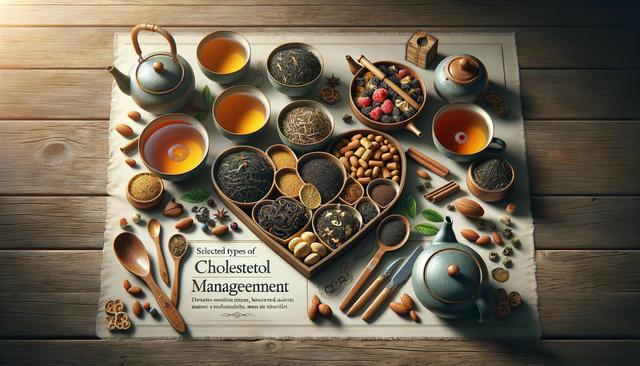
Sipping Your Way to Wellness: A Guide to 7 Teas Known for Their Cholesterol-Modulating Properties
Green Tea: A Time-Tested Ally for Heart Health
Green tea has long been celebrated for its potential to support cardiovascular wellness, and its role in cholesterol management is backed by a growing body of research. Rich in catechins, particularly epigallocatechin gallate (EGCG), green tea may help lower levels of LDL cholesterol while maintaining or even increasing HDL cholesterol levels. The antioxidants in green tea are believed to assist in reducing oxidative stress, which is a contributing factor in the development of atherosclerosis.
Regular consumption of green tea could be a simple yet effective way to support overall lipid balance. For those looking to incorporate it into their routine, consider the following tips:
- Drink 2–3 cups daily for a steady intake of beneficial compounds
- Opt for loose-leaf varieties for higher antioxidant content
- Avoid adding sugar or cream to maintain its health benefits
While green tea alone isn’t a cure-all, it can complement a cholesterol-conscious lifestyle that includes a balanced diet and regular physical activity.
Hibiscus Tea: A Floral Boost for Lipid Control
Known for its vibrant red color and tangy flavor, hibiscus tea offers more than just aesthetic and taste appeal. This herbal infusion contains anthocyanins and other polyphenols that may support the reduction of LDL cholesterol and triglycerides. Some studies suggest that drinking hibiscus tea regularly could contribute to improved lipid profiles, especially in individuals with metabolic syndrome or mild hyperlipidemia.
Hibiscus tea may be enjoyed both hot and cold, making it a versatile option year-round. To maximize its potential benefits, consider the following:
- Brew with dried hibiscus petals for a more potent infusion
- Consume unsweetened to avoid unnecessary sugar intake
- Pair with lemon juice for added vitamin C
As part of a heart-healthy regimen, hibiscus tea can be a flavorful way to encourage better cholesterol balance while also supporting hydration and overall wellness.
Oolong Tea: Bridging the Gap Between Green and Black
Oolong tea, partially oxidized and sitting between green and black tea in terms of flavor and composition, contains a unique blend of antioxidants that may aid in cholesterol modulation. The polyphenols in oolong tea have been linked to improved lipid metabolism and a potential reduction in LDL cholesterol levels.
Drinking oolong tea regularly might support the liver’s processing of fats and contribute to balanced cholesterol levels over time. Suggestions for incorporating oolong tea include:
- Drinking a cup after meals to assist with digestion and fat metabolism
- Choosing high-quality, traditionally processed oolong for richer antioxidant content
- Monitoring caffeine intake if consumed in larger quantities
Though research is still evolving, oolong tea represents a promising addition to a cholesterol-focused dietary approach.
Rooibos Tea: A Caffeine-Free Option with Potential
For those seeking a caffeine-free alternative, rooibos tea offers a gentle yet potentially effective option for cholesterol management. Derived from the South African red bush, rooibos is rich in aspalathin and other antioxidant compounds that may contribute to lowering LDL levels and improving overall cardiovascular markers.
Rooibos is naturally sweet and can be enjoyed without additives, making it an ideal evening beverage. Its potential benefits include:
- Supporting antioxidant defenses that protect blood vessels
- Offering a calming, caffeine-free experience suitable for all ages
- Blending well with other herbs like cinnamon or ginger for added benefits
Although more human studies are needed, the existing research on rooibos tea suggests it could play a supportive role in a holistic cholesterol-lowering strategy.
Black Tea: Traditional Comfort with Cardiovascular Benefits
Black tea, one of the most widely consumed teas globally, contains theaflavins and other antioxidant compounds that have been examined for their effect on cholesterol. Some studies report that regular black tea consumption may help reduce total cholesterol and LDL levels without negatively affecting HDL cholesterol.
Black tea’s bold flavor and widespread availability make it a practical choice for those looking to enhance their heart health through everyday habits. To optimize its use:
- Enjoy plain or with a splash of plant-based milk
- Limit added sweeteners to maintain health benefits
- Combine with lemon for a refreshing twist and added vitamin C
Black tea’s potential to contribute to cholesterol management, when consumed in moderation and as part of a balanced lifestyle, makes it a dependable option worth considering.
Conclusion: Embracing Tea as Part of a Heart-Healthy Lifestyle
Incorporating tea into your daily routine can be a flavorful and nourishing way to support cholesterol management. From the antioxidant-rich green and oolong teas to caffeine-free options like rooibos, each offers unique compounds that may assist in maintaining a healthy lipid profile. While these teas are not a replacement for medical treatment or lifestyle changes, they can complement a heart-conscious approach that includes a nutritious diet, physical activity, and regular health monitoring.
As always, it is advisable to consult with a healthcare provider before making significant changes to your diet, especially if you are managing a health condition. With thoughtful choices and consistent habits, sipping your way to wellness becomes a pleasant and sustainable journey.